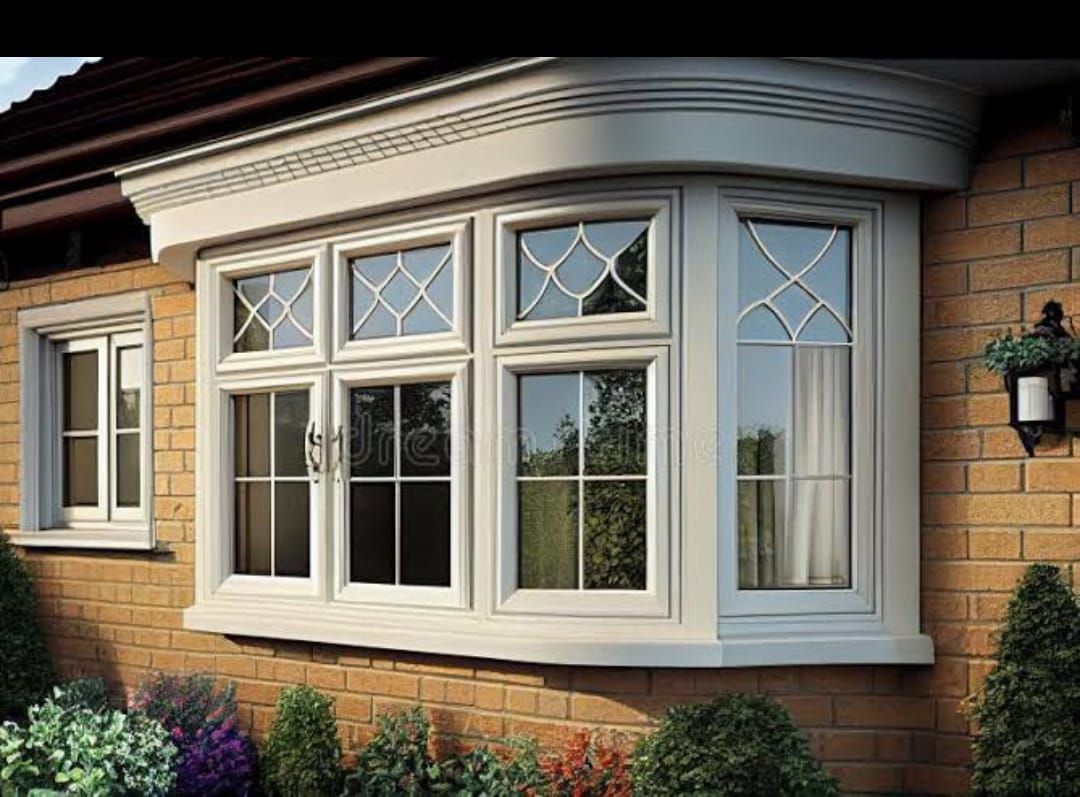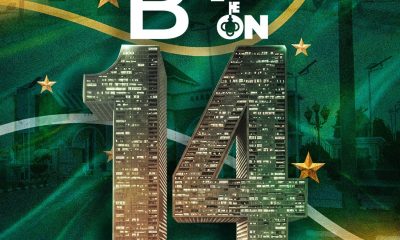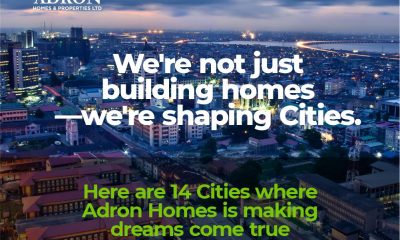Business
The Importance of PVC in Your Building by Dennis Isong

The Importance of PVC in Your Building by Dennis Isong
Polyvinyl Chloride (PVC) is a synthetic plastic polymer made from the polymerization of vinyl chloride. It is one of the most widely produced plastics in the world, known for its versatility, durability, and cost-effectiveness. PVC is composed of two basic building blocks: chlorine derived from industrial-grade salt and ethylene, which is obtained from petroleum or natural gas. The result is a highly durable and malleable material that can be manufactured in both rigid and flexible forms.
In its rigid form, PVC is commonly used in the construction industry for pipes, window frames, doors, and other structural applications. In its flexible form, it is used for a variety of purposes such as electrical cable insulation, flooring, and roofing membranes. Its resistance to environmental degradation, chemicals, and moisture makes PVC an ideal choice for many building applications.
How PVC Gained Popularity in Nigerian Buildings
PVC’s rise to prominence in Nigeria’s building industry can be traced back to the late 20th century, when there was a growing demand for affordable and durable construction materials. Prior to the widespread use of PVC, Nigerian construction largely relied on traditional materials such as wood, metal, and concrete, each of which had its own set of limitations.
Wood, while aesthetically pleasing, was susceptible to termites, rot, and warping, especially in Nigeria’s humid climate. Metal was prone to rust and corrosion, and concrete, though strong, was often expensive and difficult to mold into intricate shapes.
As the Nigerian economy began to grow, driven by oil revenues and urbanization, there was a push to modernize infrastructure and housing. PVC emerged as a solution to many of the challenges posed by traditional materials. Its versatility, affordability, and resistance to environmental factors made it an attractive option for builders and architects. The ability to mass-produce PVC products also meant that they could be made available to a broader market at lower costs.
PVC’s popularity further soared with the advent of PVC ceiling panels, doors, and windows, which became common features in Nigerian homes and commercial buildings. These products offered a modern look, were easy to maintain, and provided a practical alternative to more expensive materials. Over time, the use of PVC expanded to other areas such as plumbing, wiring, and interior finishes, cementing its place in Nigeria’s construction industry.
Importance of PVC
The importance of PVC in building construction cannot be overstated. Its role in modern architecture and construction has transformed the way buildings are designed and built. Below are some of the key reasons why PVC is so crucial in construction:
1. Cost-Effectiveness: One of the main reasons for PVC’s widespread use is its cost. Compared to traditional materials like wood, metal, and glass, PVC is relatively inexpensive. This affordability allows builders to keep construction costs down while still maintaining quality.
2. Durability: PVC is resistant to weathering, chemicals, and corrosion, which makes it ideal for use in harsh environmental conditions. Whether it’s the humid climate of Lagos or the dry heat of the northern regions, PVC products are built to last, reducing the need for frequent replacements.
3. Versatility: PVC can be molded into various shapes and sizes, making it suitable for a wide range of applications. From pipes and fittings to window frames and ceiling panels, the material can be used in almost every aspect of building construction.
4. Low Maintenance: PVC requires minimal maintenance. It does not need painting, polishing, or sealing, unlike wood or metal. This reduces the long-term costs associated with building upkeep.
5. Energy Efficiency: PVC’s insulating properties make it an excellent choice for windows and doors, helping to maintain indoor temperatures and reduce energy consumption in buildings.
6. Safety: PVC is a safe material for use in construction. It is fire-resistant and does not ignite easily. In the event of a fire, PVC products tend to self-extinguish, reducing the spread of flames.
7. Environmental Impact: Although PVC is a plastic, advancements in recycling technology have made it possible to recycle PVC products, reducing their environmental footprint. Many PVC manufacturers are now producing eco-friendly options that are made from recycled materials.
Advantages of PVC
PVC offers numerous advantages that make it an attractive choice for builders, architects, and homeowners alike:
1. Lightweight: PVC is much lighter than traditional building materials like wood or metal. This makes it easier to transport, handle, and install, reducing labor costs and construction time.
2. Water Resistance: PVC’s inherent resistance to moisture makes it an excellent material for use in plumbing and roofing applications. It does not rot or degrade when exposed to water, ensuring long-lasting performance in wet conditions.
3. Chemical Resistance: PVC is highly resistant to chemicals, acids, and alkalis, making it suitable for use in industrial applications where exposure to harsh substances is common.
4. Aesthetic Appeal: PVC products are available in a variety of colors, textures, and finishes, allowing builders to achieve the desired aesthetic look for their projects. Whether it’s a glossy finish for modern interiors or a wood-grain texture for a classic look, PVC offers endless design possibilities.
5. Noise Insulation: PVC’s insulating properties extend beyond just thermal insulation. It also provides excellent noise insulation, making it ideal for use in windows, doors, and walls to create a quieter indoor environment.
6. Recyclability: PVC is one of the few plastics that can be recycled multiple times without losing its properties. This makes it a more sustainable choice compared to other plastics, which often degrade in quality with each recycling cycle.
7. Flexibility: Flexible PVC can be used in applications where traditional rigid materials would not be suitable. This includes electrical cable insulation, flooring, and flexible piping.
Disadvantages of PVC
While PVC offers many advantages, it also has some drawbacks that should be considered:
1. Environmental Concerns: The production of PVC involves the use of chlorine, which can release harmful chemicals if not managed properly. Additionally, the disposal of PVC products at the end of their life cycle can pose environmental challenges, as they do not biodegrade easily.
2. Toxicity: When PVC is burned, it can release toxic fumes, including dioxins, which are harmful to both human health and the environment. This makes the improper disposal of PVC products a significant concern.
3. Limited Temperature Resistance: While PVC is resistant to many environmental factors, it has a limited temperature range. Exposure to extremely high or low temperatures can cause PVC to warp, crack, or become brittle.
4. Not as Strong as Metal: Although PVC is durable, it is not as strong as materials like steel or aluminum. For applications that require high structural strength, PVC may not be the best choice.
5. Plastic Appearance: Despite advances in design, some people still perceive PVC as having a “plastic” look, which may not be desirable for certain high-end or luxury applications.
6. Potential for Degradation: Over time, PVC can degrade when exposed to UV radiation from the sun. This can cause discoloration, brittleness, and a loss of structural integrity, especially in outdoor applications.
Conclusion
PVC is a valuable material in the building industry, offering a balance of cost, performance, and versatility. As the construction landscape continues to evolve, the use of PVC is likely to remain prominent, especially with ongoing advancements in recycling and sustainable production methods. Builders, architects, and homeowners must weigh the benefits and disadvantages of PVC to make informed decisions that align with their specific needs and environmental considerations.
For personalized assistance with your property needs, contact Dennis Isong, a top Lagos realtor specializing in helping Nigerians in the diaspora own property stress-free.
Contact: +2348164741041
Business
Nigeria’s Inflation Drops to 15.10% as NBS Reports Deflationary Trend

Nigeria’s headline inflation rate declined to 15.10 per cent in January 2026, marking a significant drop from 27.61 per cent recorded in January 2025, according to the latest Consumer Price Index (CPI) report released by the National Bureau of Statistics.
The report also showed that month-on-month inflation recorded a deflationary trend of –2.88 per cent, representing a 3.42 percentage-point decrease compared to December 2025. Analysts say the development signals easing price pressures across key sectors of the economy.
Food inflation stood at 8.89 per cent year-on-year, down from 29.63 per cent in January 2025. On a month-on-month basis, food prices declined by 6.02 per cent, reflecting lower costs in several staple commodities.
The data suggests a sustained downward trajectory in inflation over the past 12 months, pointing to improving macroeconomic stability.
The administration of President Bola Ahmed Tinubu has consistently attributed recent economic adjustments to ongoing fiscal and monetary reforms aimed at stabilising prices, boosting agricultural output, and strengthening domestic supply chains.
Economic analysts note that while the latest figures indicate progress, sustaining the downward trend will depend on continued policy discipline, exchange rate stability, and improvements in food production and distribution.
The January report provides one of the clearest indications yet that inflationary pressures, which surged in early 2025, may be moderating.
Bank
Alpha Morgan to Host 19th Economic Review Webinar

Alpha Morgan to Host 19th Economic Review Webinar
In an economy shaped by constant shifts, the edge often belongs to those with the right information.
On Wednesday, February 25, 2026, Alpha Morgan Bank will host the 19th edition of its Economic Review Webinar, a high-level thought leadership session designed to equip businesses, investors, and individuals with timely financial and economic insight.
The session, which will hold live on Zoom at 10:00am WAT and will feature economist Bismarck Rewane, who will examine the key signals influencing Nigeria’s economic direction in 2026, including policy trends, market movements, and global developments shaping the local landscape.
With a consistent track record of delivering clarity in uncertain times, the Alpha Morgan Economic Review continues to provide practical context for decision-making in a dynamic environment.
Registration for the 19th Alpha Morgan Economic Review is free and can be completed via https://bit.ly/registeramerseries19
It is a bi-monthly platform that is open to the public and is held virtually.
Visit www.alphamorganbank to know more.
Business
GTBank Launches Quick Airtime Loan at 2.95%

GTBank Launches Quick Airtime Loan at 2.95%
Guaranty Trust Bank Ltd (GTBank), the flagship banking franchise of GTCO Plc, Africa’s leading financial services group, today announced the launch of Quick Airtime Loan, an innovative digital solution that gives customers instant access to airtime when they run out of call credit and have limited funds in their bank accounts, ensuring customers can stay connected when it matters most.
In today’s always-on world, running out of airtime is more than a minor inconvenience. It can mean missed opportunities, disrupted plans, and lost connections, often at the very moment when funds are tight, and options are limited. Quick Airtime Loan was created to solve this problem, offering customers instant access to airtime on credit, directly from their bank. With Quick Airtime Loan, eligible GTBank customers can access from ₦100 and up to ₦10,000 by dialing *737*90#. Available across all major mobile networks in Nigeria, the service will soon expand to include data loans, further strengthening its proposition as a reliable on-demand platform.
For years, the airtime credit market has been dominated by Telcos, where charges for this service are at 15%. GTBank is now changing the narrative by offering a customer-centric, bank-led digital alternative priced at 2.95%. Built on transparency, convenience and affordability, Quick Airtime Loan has the potential to broaden access to airtime, deliver meaningful cost savings for millions of Nigerians, and redefine how financial services show up in everyday life, not just in banking moments.
Commenting on the product launch, Miriam Olusanya, Managing Director of Guaranty Trust Bank Ltd, said: “Quick Airtime Loan reflects GTBank’s continued focus on delivering digital solutions that are relevant, accessible, and built around real customer needs. The solution underscores the power of a connected financial ecosystem, combining GTBank’s digital reach and lending expertise with the capabilities of HabariPay to deliver a smooth, end-to-end experience. By leveraging unique strengths across the Group, we are able to accelerate innovation, strengthen execution, and deliver a more integrated customer experience across all our service channels.”
Importantly, Quick Airtime Loan highlights GTCO’s evolution as a fully diversified financial services group. Leveraging HabariPay’s Squad, the solution reinforces the Group’s ecosystem proposition by bringing together banking, payment technology, and digital channels to deliver intuitive, one-stop experiences for customers.
With this new product launch, Guaranty Trust Bank is extending its legacy of pioneering digital-first solutions that have redefined customer access to financial services across the industry, building on the proven strength of its widely adopted QuickCredit offering and the convenience of the Bank’s iconic *737# USSD Banking platform.
About Guaranty Trust Bank
Guaranty Trust Bank (GTBank) is the flagship banking franchise of GTCO Plc, a leading financial services group with a strong presence across Africa and the United Kingdom. The Bank is widely recognized for its leadership in digital banking, customer experience, and innovative financial solutions that deliver value to individuals, businesses, and communities.
About HabariPay
HabariPay is the payments fintech subsidiary of GTCO Plc, focused on enabling fast, secure, and accessible digital payments for individuals and businesses. By integrating payments and digital technology, HabariPay supports innovative services that make everyday financial interactions simpler and more seamless.
Enquiries:
GTCO
Group Corporate Communication
[email protected]
+234-1-2715227
www.gtcoplc.com
-

 celebrity radar - gossips6 months ago
celebrity radar - gossips6 months agoWhy Babangida’s Hilltop Home Became Nigeria’s Political “Mecca”
-

 society6 months ago
society6 months agoPower is a Loan, Not a Possession: The Sacred Duty of Planting People
-

 society5 months ago
society5 months agoReligion: Africa’s Oldest Weapon of Enslavement and the Forgotten Truth
-

 news6 months ago
news6 months agoTHE APPOINTMENT OF WASIU AYINDE BY THE FEDERAL GOVERNMENT AS AN AMBASSADOR SOUNDS EMBARRASSING









